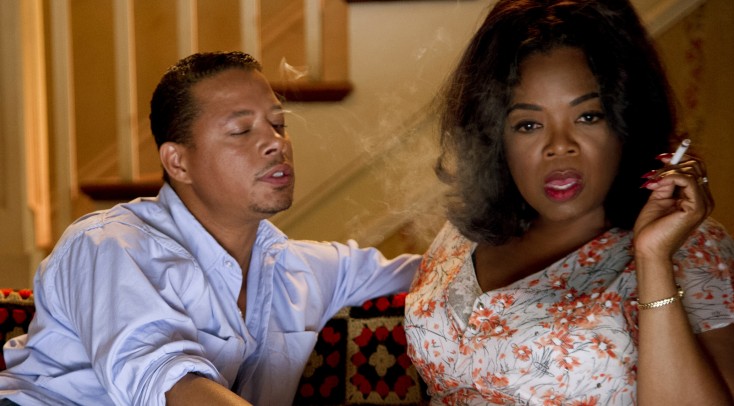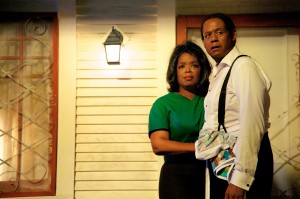By ANGELA DAWSON
Front Row Features
NEW YORK—It’s been 15 years since media titan Oprah Winfrey starred in a film. She was nominated for a NAACP award for her performance in “Beloved,” a post-Civil War drama in which she played an ex-slave determined to make a better life for her children.
Since then, Winfrey has been preoccupied with her many business ventures, including building her burgeoning OWN network.
It took a filmmaker with the determination and fortitude of Lee Daniels (“Precious,” “Monsters Ball”) to convince the talk show queen to return to acting and play a pivotal role in his epic ensemble movie “Lee Daniels’ The Butler.”
As Gloria, Winfrey is the wife of the title character (Forest Whitaker), an African-American who rose from the cotton fields to become a butler at the White House for eight administrations. While her husband toils away for years serving various administrations while black Americans struggle for their civil rights, Gloria is responsible for taking care of the home front—raising their two sons and keeping the house in order. She struggles with personal demons as well. She smokes and drinks and fools around with the next-door neighbor, yet she loves her husband and family unconditionally.
The 59-year-old Winfrey recently spoke about getting back into acting through the sheer will that is Daniels, and what the story of “The Butler” meant to her. The script was penned by Danny Strong, who adapted the work from a Washington Post article written about the real Cecil Gaines, who served at the Executive Mansion from 1952 until 1986, observing the social turmoil of the country from a unique view from inside the seat of power.
Q: What made you want to get involved?
Winfrey: Lee.
Q: He was relentless, right?
Winfrey: He was. And I was telling him, “Lee I’ve got a network thing going on,” and he wouldn’t listen to me. But I’m glad I said yes. I finally said yes because of the story itself. He’s been talking to be about the story and (my character Gloria) for some time. I’m a student of my own history, of African-American history, and I believe that when you know who you are you have the ability to move forward with the strength not only of yourself, but of your entire ancestry. So the ability to tell that story of “The Butler” in an entertaining way that would offer an opportunity for the rest of the world to experience a part of our history that made our nation who and what we are and to demonstrate the love story of an African American family in a way that tenderness is exposed to the world so that people can see that we’re more alike than different.
Q: What do you think will resonate with audiences?
Winfrey: When you see (Forest and me) at the bus station sending our son off to college—it’s how every parent, regardless of race or economic background feels when you have to let go of your son. When you see us sitting at the breakfast table in the morning, I wanted to communicate that sense of love, connection and tenderness and also to allow the spirit and integrity of all the African American women, colored, Negro at the time, who stood by their men and held the families together with their grit and determination, and allowed their own dreams to be repressed. I thought a lot about what it meant to be a woman in the ‘50s and ‘60s, a woman like Gloria or a woman like myself, or any of the other women in this room—all of us have got a little fire inside. Gloria had a little fire inside of herself. It’s about what it’s like to be the kind of woman who, you have that fire but what do you do with it. You just can’t watch “Edge of Night” all day long and make a tuna fish sandwich and drink a beer. So that’s why (Gloria) tiptoed with the next-door neighbor, Terrence (Howard’s character) a little bit.
Q: When he looks like Terrence Howard, it doesn’t hurt, does it?
Winfrey: He didn’t quite look like (he does now). Terrence is such a brilliant actor that he came to set the first day and he ha removed the cap from his tooth. So he has this big gaping hole. The opportunity to show who the women were of that era, because Gloria is not, for me, just herself but a composite of women of that era, who sacrificed and who also who also were the stabilizing force in the family. Because the butler couldn’t have been who he was, and still have a family, had it not been for her. So I loved all of that about the script.
Q: Do you feel there are two faces that you present in public—one to white people and another to black people?
Winfrey: I don’t feel that at all. I feel that I have made a living being myself. When I was 19 years old, I interviewed Jesse Jackson as a young reporter in Nashville, Tenn., and he said to me then, “One of your gifts is being able to be yourself on TV.” So when I moved to Chicago and I was up against what was then “the King of Talk,” my boss at the time called me into his office and said, “Listen, we know you’ll never be able to beat him, so just go on the air and be yourself.” So I have made a career out of my own authenticity. I don’t have one face that I present to the white world or the black world. I talk to my dogs the same way I’m speaking right now. (She chuckles.) So it’s always been the same for me. And I say that with great pride and homage and honor to the people who were the generation before me. That’s one of the reasons why I wanted to be in this movie. It is because I am the daughter of a maid and my grandmother was a maid and her mother was a maid and her mother was a slave. So the domestic worker and the speech that Dr. King gives to my son in the movie I feel validated by their courage. I feel validated by the war that the butler and his entire generation fought in their own way. The fact that there is another generation of freedom riders and freedom fighters, who because of growth and evolution and change decided we’re not going to do that anymore, I think that also was necessary. So both wars were necessary for the time. But there is a wonderful poem by Paul Lawrence Dunbar called “We Wear the Mask” that I learned as a little girl, but because of the courage and the conviction of an entire generation whose shoulders we all stand on I never had to do it.
Q: What moment in the film resonated most with you?
Winfrey: I wanted to ask Yaya DaCosta (who plays a Black Panther member) a question because I’ve seen the movie three times and every time I see you get spit on, does something primal take over? There’s nothing worse in the world and I think of all those people that did that for us, but you’re an actor. I wonder when somebody spits on you does it take you to another space inside yourself, because we felt it.
Q: What makes Lee Daniels unique and what part of this process convinced you think he was the essential director for this film?
Winfrey: I had worked behind with him on “Precious” behind the scenes so I wanted the opportunity to be in his hands really. Contrary to what everybody may assume about me or what some people assume, I’m really not a control freak. I really like hiring people. As I run my businesses, I like hiring people who know what they’re doing so I don’t have to do it, and then come back and tell me that it’s done. That’s really how I like to operate. So the whole notion that I’m the kind of person that likes to control everything, I am not. But there were some things on set because I was the oldest people on set because I’d lived through the Kennedy assassination that I had some definite opinions about it. This is why I would say what’s exciting and why we love him. He is a truth seeker. He will literally not let any of his actors get away with a breath that’s a false moment. I can testify to that because he pulled me over to the monitor one day and he said, “See how you’re leaning in there and see how you took a breath? Drop the breath.” I went, “Drop the breath? You mean, like, don’t breathe?” And he said, “I don’t want to hear it. I want to see it.” So I would have to say in every moment he doesn’t allow you as an actor get away with anything that remotely appears to be fake. And if he does, he’ll start yelling, “Fake!”
Q: How would you introduce writer Danny Strong and what is his teachable moment?
Winfrey: His teachable moment for this movie is that he had the absolute privilege of not just being around and interviewing the butler but experiencing the energy of him in a way that none of us did. So I think what he was able to put into a script was the heart and soul of “The Butler.” It’s not just his story but also a compilation of all the stories of all the men who were like him. That would be the teachable moment. I think the movie is the teachable moment.






